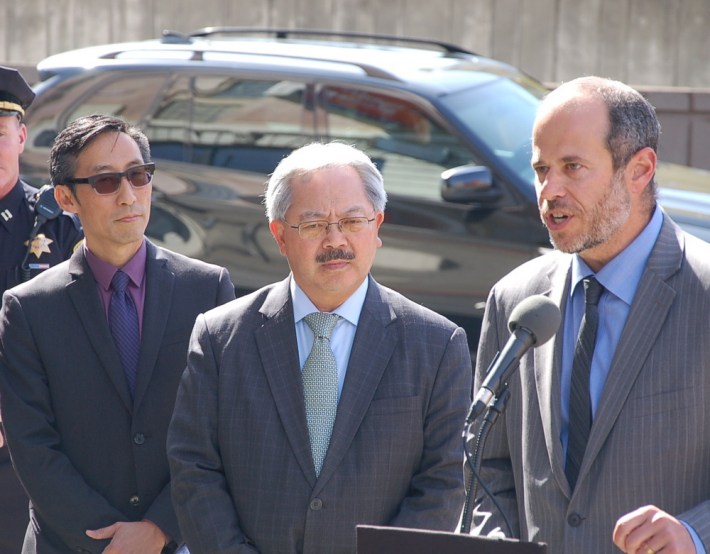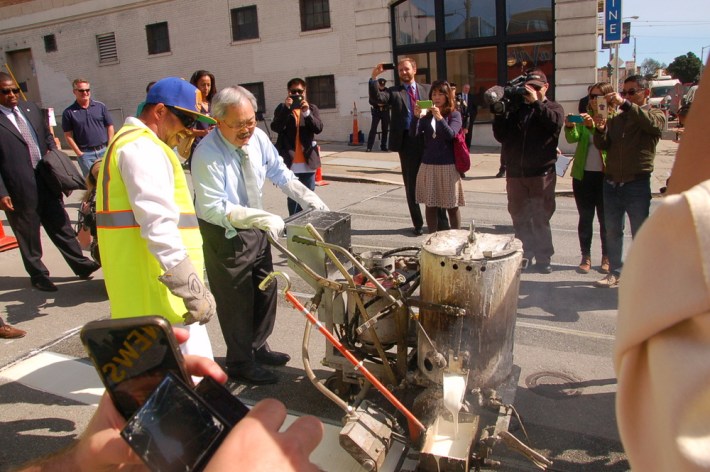
Mayor Ed Lee shocked safe streets advocates when he told Streetsblog two weeks ago, "We shouldn’t promote bicycle safety over pedestrian safety over cars and parking" on Polk Street. "I think they’re all going to be important."
The Vision Zero Coalition sent a letter [PDF] last week asking Lee to clarify his statement, saying it gave "the impression that convenience trumps concern for the lives and well-being of vulnerable road users." (You can listen to the audio of the interview below.)
"Your comments," the letter to the mayor said, "undermine your own stated commitment to Vision Zero and suggest to City staff that the City’s leadership is willing to slide when it comes to safety and our city’s Vision Zero goals, wavering in the face of first resistance."
But the mayor's response letter [PDF] received by the coalition yesterday didn't state that saving lives is more important than car parking. The mayor wrote that he's "proud to lead" the Vision Zero effort, but that "we must be balanced in our approach," and pointed to his recent efforts to pass a transportation funding bond measure and the city's release of a two-year action strategy.
The coalition was "disappointed that the content of this letter does not address our request," but "instead reiterates the Mayor's belief that the safety of all modes are equally critical," SF Bicycle Coalition Policy Director Tyler Frisbee wrote in an email response. The Vision Zero Coalition is lead by Walk SF and the SFBC, and includes nearly 40 local organizations.
At a press conference on Vision Zero today, SF Examiner reporter Joe Fitzgerald Rodriguez pressed the mayor on his Streetsblog quote concerning Polk, even before I could get the questions in myself.
"You recently told Streetsblog bikes were not as important as pedestrians or as parking," Rodriguez told the mayor. "Can you clarify those remarks?"
"Yeah, I don't think that's the right interpretation," Lee said. "What I was trying to say was that MTA has a very difficult time in determining, particularly on Polk Street, the level of things that have to occur there that will seek some kind of balance on the different interests that were coming. And I need to leave it to them to have that expertise, rather than me saying or dictating what has to happen."
Rodriguez followed up: "In what situations in the balance does parking trump bicycle and pedestrian safety?"
"Well, I don't know," Lee said. "Again, I'll have to leave it to the MTA to be the entity that makes the best decision possible for what's going on on the entire Polk Street. They have to listen to everybody and they have to take everybody's concerns into heart today, as well as every day." Only then did Lee add, "We've said that pedestrian safety and the safety of everybody has to be the pre-eminent policy."
Rodriguez then asked Lee if he thinks his efforts on street safety "have been as strong and as forceful" as New York City Mayor Bill de Blasio's. The mayor said "we're doing the best we can," and pointed to the passage of the Proposition A bond measure last year, which he helped promote. However, he also dropped his support for a vehicle license fee and used his leverage over the SFMTA to repeal Sunday parking meters.
Rodriguez pressed Lee further, noting that traffic fatalities have continued on streets known to be dangerous, where redesign efforts have taken years.
"We're moving to these streets as fast as we can," Lee said in response. "I know that ... supervisors have those streets in mind, and we're giving as much treatment as possible. Some streets take a little longer time."
At that point, the mayor's communications director cut off questions from the press.

The press conference seemed peculiar. It was apparently called by the mayor's office at the last minute to publicize the SFMTA's ongoing striping of better crosswalks along Geary Boulevard. There wasn't a clear impetus or announcement, which confused some of the reporters who showed up. There was, however, a photo op for Lee to push a thermoplastic striping machine to demonstrate how zebra-style crosswalks are installed.
The event was held at the corner of Geary and Emerson Street, next to the massive intersection with Masonic and Presidio Avenues. The SFMTA, D1 Supervisor Eric Mar, and Walk SF (which was unable to send anyone) said they only heard about the event late yesterday.
While the timing seemed rushed and arbitrary, the conference was held the day after the mayor's office issued its response about Lee's comments regarding Polk.
In an apparent coincidence, a van driver yesterday killed 87-year-old Alfred Yee at Geary and 26th Avenue, outside of a senior center in the Richmond District. Yee was the first pedestrian killed this year.
"I'm angry, I'm seething inside," Supervisor Mar said at the podium. "We've known about these [dangerous streets] for years. How long will it take for us to take much more rapid action with Vision Zero so we can prevent these unfortunate -- they're not accidents -- killings?"
Mar had no problem telling reporters safety is more important than car storage. "Lives and street safety should be the number one priority, well over whether people who drive their cars have access to parking on public space."
When asked what could expedite safety improvements on SF's streets, Mar told reporters, "It starts at the top. Things could move really quickly if those in the top-level power positions in the city were to put more money with good planning."
In a directionless speech delivered amidst thermoplastic fumes, Mayor Lee predictably emphasized that the onus is on the public to have a "higher level of awareness of safety," as exemplified in his "Be Nice, Look Twice" campaign. He touted the passage of the Prop A bond, saying, "We, as a city, came together and agreed last November that we're going to put some very serious resources into Vision Zero so that it isn't just a pronouncement, that we make these things happen on as many street corners as possible," referring to new crosswalks.
The mayor's statements were par for the course when it comes to Vision Zero. He has occasionally shown promise as a safe streets proponent, pledging to fund the SF Pedestrian Strategy in 2013, and touting the release of pedestrian safety infrastructure plans. But his embrace of Vision Zero -- an end to traffic deaths -- has been tepid, and he isn't known to attend events focused on victims of traffic violence.
"The mayor championed the funding," said Walk SF Executive Director Nicole Schneider. "Why the reluctance to celebrate and support the fruits of that labor?"




